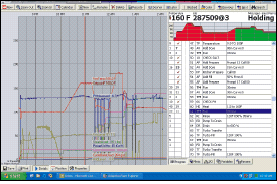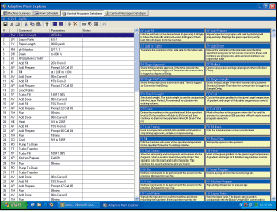Plant
Explorer Upgraded To DotNet
-------------------------------------------------------------------
1st
June 2004
By Adaptive Staff Writer
 HALIFAX,
UK - The flagship plant control and supervisory
system from Adaptive, previously known as
Plant Explorer, has now completed successful
dyehouse trials, and is proving a big hit.
The system, now known as Plant Explorer
DotNet, boasts new levels of features and
reliability, but still maintains compatibility
with the large existing user-base served
by previous versions of Plant Explorer and
the Beacon 2800 system. HALIFAX,
UK - The flagship plant control and supervisory
system from Adaptive, previously known as
Plant Explorer, has now completed successful
dyehouse trials, and is proving a big hit.
The system, now known as Plant Explorer
DotNet, boasts new levels of features and
reliability, but still maintains compatibility
with the large existing user-base served
by previous versions of Plant Explorer and
the Beacon 2800 system.
DotNet is also the name of the award-winning
Microsoft Windows platform that has become
the first choice for new developments on
PCs, and this is no coincidence since Plant
Explorer now uses all the power and latest
technology of this Microsoft innovation.
We asked David Tindale, Director of System
Research at Adaptive, what he thought this
would mean to Adaptive Customers who might
be contemplating the upgrade.
SW: "Plant Explorer is a system that
is at the heart of dyehouse production for
customers. What do you think will be the
most obvious benefits for an existing customer
of moving on to the new DotNet version ?"
David Tindale: "Well that's rather
a broad question, and perhaps before answering
that, it might be helpful just to backtrack
for a moment and remind ourselves of the
Plant Explorer history. Back in the very
early days of PCs, the original 2800 system
was a market-leader because of advanced
features like job scheduling and extensive
history storage not normally seen in the
industry. In one way, nothing much has changed
since those days, whereas in another way
everything has changed",
SW: "Do you mean that the basic functions
of a plant supervisory system haven't changed
much since then ?"
David Tindale: "What we saw coming
along at that time was a greater emphasis
on integration with other automatic systems
like dispensing, and also the need for multiple
terminals. And we put those features in.
But all the time, technology is moving on
in parallel and it wasn't long before Windows
came out."
SW: "And this was all still on the
2800 platform ?"
 David
Tindale: "Yes, the move to Windows
was the last big change to the system that
we were involved with on the 2800. It certainly
was a high-water mark at the time in a lot
of ways, and you know what was interesting
about it was that the users in the dyehouse
seem to have no problems at all getting
used to clicking with a mouse and so on
- some people had worried that using Windows
might be too hard. Well we needn't have
worried, and looking back now with Windows
everywhere, it seems a funny thing to even
worry about." David
Tindale: "Yes, the move to Windows
was the last big change to the system that
we were involved with on the 2800. It certainly
was a high-water mark at the time in a lot
of ways, and you know what was interesting
about it was that the users in the dyehouse
seem to have no problems at all getting
used to clicking with a mouse and so on
- some people had worried that using Windows
might be too hard. Well we needn't have
worried, and looking back now with Windows
everywhere, it seems a funny thing to even
worry about."
SW: "But then came the first versions
of Plant Explorer ?"
David Tindale: "Yes, along with everything
else ! This was the time when Adaptive the
company was being set-up, and Mike (Lynch
ed.) and I had a lot on our plates ! And
of course Plant Explorer had to be built
completely from scratch at that time. The
other interesting thing going on then was
that the new technology emphasis we were
offering at Adaptive was based around the
machine controllers changing from proprietary
hardware to the PC platform, which was itself
a big step forward. It didn't bring too
many new features to Plant Explorer though,
and so progress wasn't as dramatic on Plant
Explorer as it had been up until then."
SW: "What about using PCs as controllers
? How was that ?"
David Tindale: "Amazingly reliable,
once the system was perfected. And it meant
that a lot of the host system features could
be put onto the controllers as well - histories,
schedules, etc. The other thing it got us
into, though, was having to be compatible
with different kinds of controllers - Beacons,
APC's, and so on."
SW: "Right"
David Tindale: "At the moment we're
just adding support for Gaston Controllers....
A controller is a controller really. And
sometimes we can make it seem more powerful
than it really is, by connecting a Plant
Explorer
to it."
SW: "And web-pages ?"
David Tindale: "Yes, that's a useful
additional feature - but getting software
to install and work first time across the
5 or 10 PC's you typically find pre-existing
in a plant is an interesting challenge.
All different versions of Windows, with
various service packs and programs installed.
Solving that is one of the things that DotNet
does for us ?"
SW: "So what is DotNet ? The phrase
may be vaguely familiar to some of our readers."
David Tindale: "Put simply, it's a
big upgrade to Windows to make writing Windows
programs easier and more productive. Which
is good for users too, of course, when these
great new programs come along. For Adaptive,
it came at a great time, because, for instance,
it solves that "installation onto various
computers" problem straight out of
the box. It also speeds up our development
cycles, and comes with some great fault-finding
and system-monitoring tools."
SW: "For a 24x7 factory"
David Tindale: "I certainly try not
to forget that the ultimate point of all
this great technology is first and foremost
to get more quality production out of a
plant. We've got some great support people
working for us, but they support Adaptive
products that run for weeks, months, years
at a time without a hiccup. It can be surprisingly
hard to achieve those levels of reliability,
with everything that can be thrown at a
system."
SW: "So DotNet gives you extra reliability
?"
David Tindale: "Yes it does. And predicability.
And the next path to the future to PC systems.
Microsoft are a huge presence on PCs, and
we think DotNet is one of their best ideas
for a while. Plant Explorer will get slicker,
faster, better features and even more reliable.
And I think that's a great story for customers."
SW: "Thanks very much for your time,
David"
David Tindale: "You're very welcome."
|